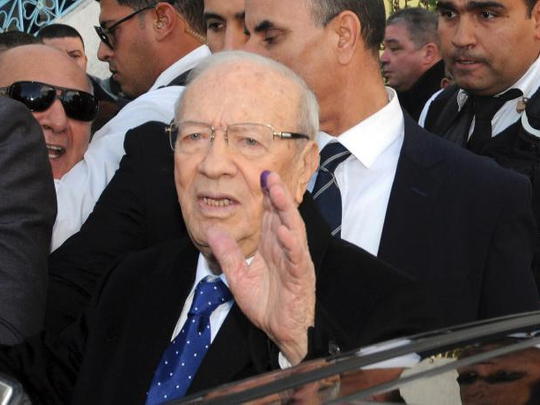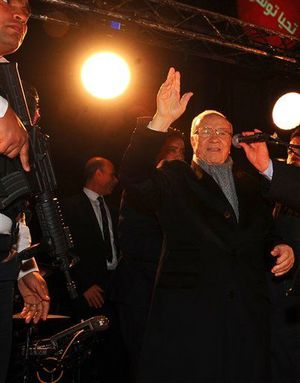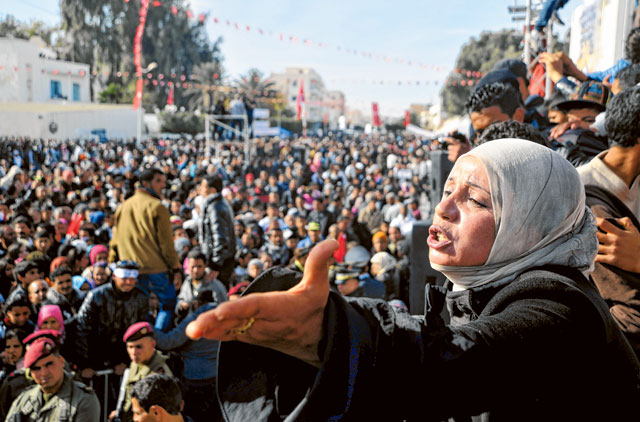
Tunis: Tunisia's election commission says an 88-year-old former government minister has won the presidential runoff with 55.68 percent of the vote.
The election of Beji Qaid Al Sebsi, whose party dominated legislative elections back in October, completes Tunisia's democratic transition after the overthrow of its dictator in 2011.
Outgoing interim president Moncef Marzouki received 44.32 percent of the vote, election commission chief Chafik Sarsar said on Monday.
Exit polls had predicted similar results soon after polls closed Sunday night.
Voting was largely pronounced free and fair with a participation rate of 60 percent, less than the nearly 70 percent in the previous round and legislative elections.
Protests
AFP reported that after the declaration of Sebsi, police fired tear gas to disperse hundreds of youths who burned tyres in protest at the result.
Al Sebsi, an 88-year-old former official in previous Tunisian regimes, took 55.68 per cent of the vote to defeat incumbent Monsef Marzouqi in Sunday’s run-off, the electoral commission said.
Al Sebsi had claimed victory shortly after polls closed but Marzouqi, a long-exiled 69-year-old rights activist, refused to concede defeat.
A first round of voting on November 23 had seen Al Sebsi in the lead with 39 per cent of the vote, six points ahead of Marzouqi.
Participation in the second round was 60.1 per cent, electoral commission chief Chafik Sarsar said, after authorities had urged a high turnout.
There was no immediate reaction from either camp to the official results.
The vote was seen as a landmark for democracy in Tunisia, which sparked the Arab Spring mass revolutions with the 2011 ouster of longtime strongman Zain Al Abidine Bin Ali.
The campaign was bitter and divisive, with Marzouqi insisting a win for Al Sebsi would mark the return of Tunisia’s old guard of ruling elites.
Birthplace of Arab Spring
An interim government came to power in January 2011 when an uprising prompted President Zine Al Abidine Ben Ali to leave the country after 23 years in power.
The revolt was inspired by Mohammad Bouazizi, a 26-year-old who set himself on fire after police confiscated his fruit cart. He became a symbol for angry Tunisians frustrated with high unemployment, police corruption and political repression.
In just a few months, Tunisia went from decades of strict one-party rule to an explosion of more than 30 registered political parties. Its revolution was the spark for additional uprisings across North Africa and the Middle East.
Timeline
December 17, 2010
Mohammad Bouazizi sets fire to himself in the central town of Sidi Bouzid in protest at the confiscation by police of his vegetable cart. Local people rally in support. Bouazizi later dies of his burns. Huge funeral increases momentum of protests against unemployment and repression.
January 14, 2011
After days of clashes in which dozens of people are killed, and having made empty promises of reforms and elections, Ben Ali flees to Saudi Arabia. Prime Minister Mohammad Ghannouchi stays on, with parliamentary speaker Fouad Mebazza as interim president.
February 27
Ghannouchi resigns after violent protests over his ties to Ben Ali, triggering street celebrations in Tunis. He is replaced by Beji Caid Sebsi, a former foreign minister under 1960s independence President Habib Bourguiba.
March 7
Sebsi unveils a new cabinet of technocrats rather than career politicians, none of whom had served in governments under Ben Ali. The Interior Ministry says Ben Ali’s political police and state security apparatus has been dissolved.
June 20
A Tunisian court sentences Ben Ali and his wife Leila Trabelsi, in absentia to 35 years in prison for theft and illegal possession of large sums of cash. In July a court adds a 16-year jail term for Ben Ali and his son-in-law for corruption.
October 23
Tunisia votes in the first election of the Arab Spring, choosing from among 80 political parties to form an assembly charged with drafting a constitution within a year.
December 12/13
Members of the constitutional assembly vote to elect former dissident Moncef Marzouki as president, the second most powerful role after the prime minister. Hamadi Jebeli, secretary general of the moderate Islamist Ennahda party, is designated as prime minister.
May/June 2012
Hundreds of Salafi Islamists attack bars and shops and clash with security forces in Jendouba, raising religious-secularist tensions. In June, the government lifts a curfew imposed following riots by Salafis and others over an art exhibition they deemed insulting to Islam.
November 30
Navi Pillay, UN High Commissioner for Human Rights, says Tunisian authorities must stop using firearms against demonstrators after more than 220 people are reported injured in clashes between protesters demanding jobs and police in Siliana, on the edge of the Sahara Desert.
February 6, 2013
Opposition secularist politician Chokri Belaid is shot dead, sparking huge street protests. Prime Minister Jebali calls the killing a political assassination and a strike against the “Arab Spring” revolution
February 19
Prime Minister Hamadi Jebali resigns.
February 22
Interior Minister Ali Larayedh is chosen by the ruling party, Ennahda, to be the new prime minister.
July 30
Prime Minister Larayedh concedes to opposition groups and agrees to hold elections in December 2013.
August 6
Tens of thousands of people protest in Tunis in hopes of dissolving the Constituent Assembly.
Quotable quotes:
“These incidents will never break down our determination nor undermine our achievements. Rather, they should encourage all parties to draw the necessary lessons and never detract from the imperative to continue our work with determination and enthusiasm because the dignity and invulnerability of Tunisia are a burden which are invested all Tunisian men and women.”
President Zine Al Abidine Ben Ali, four days before his resignation in January 2011
“I promised and assured that, in the event that my initiative failed, I would resign as head of the government, and that is what I have done. This is a big disappointment. Our people are disillusioned by the political class. We must restore confidence. The failure of my initiative does not mean the failure of Tunisia or the failure of the revolution,”
Prime Minister Hamadi Jebali on resiging on February 19, 2013
“I am not willing to be a person that takes decisions that would end up causing casualties. I am not running away from responsibility. This is to open the way for a new prime minister. This resignation will serve Tunisia, and the revolution and the future of Tunisia.”
Prime Minister Mohammad Ghannouchi, resigning on February 27, 2011
“This is the third killing of this nature in the past ten months. Lotfi Naghdh was killed in October 2012, and just six months ago, another prominent political figure, Chokri Belaid, was assassinated in similar circumstances to Mr. Brahmi. The investigation into Belaid’s assassination is still not concluded, and the circumstances surrounding it have not been clearly established.”
Navi Pillay, UN High Commissioner for Human Rights, July 2013
Profiles
Mohammad Bouazizi
The world knows Mohammad Bouazizi as the poor and desperate young man, harassed by the authorities, who set fire to himself in the city of Sidi Bouzid, inspiring a revolution that brought down the country’s dictator, an act still reverberating through the Arab world. There is the simple young man of 26 who worked so hard to send his sisters to school and university, selling fruit on the roadside to earn $5 (Dh18) a day. A young man who was often required to pay bribes worth more than he could earn in a day to the local authorities to set up his stall because they would not give him a permit. Who on other days – like the day he set himself on fire – had his business shut down on a whim.
Chokri Belaid
Chokri Belaid was the leader of the Marxist-Leninist Democratic Patriots Movement. He had played a key role in bringing together the coalition of 12 leftist and pan-Arab parties that came together in November 2012, under the umbrella of the Popular Front. He was assassinated on his doorstep on February 6, 2013, the first political assassination in Tunisia in half a century.
President Zine Al Abidine Bin Ali
President Zine Al Abidine Bin Ali is the former President of the Tunisian Republic. He held the office from 7 November, 1987, until he was forced to step down and flee the country on 14 January, 2011. Bin Ali was appointed Prime Minister in October 1987, and assumed the Presidency in November 1987 in a bloodless coup d’état from then President Habib Bourguiba, who was declared incompetent. Bin Ali was subsequently re-elected with enormous majorities at every election, the final time being 25 October, 2009. He was sentenced in abstentia in 2011 to 35 years in prison for theft and illegal possession of large sums of cash. Months later a court adds a 16-year jail term for Bin Ali and his son-in-law for corruption.
Egyptian scenario
Tunisia is facing the most severe political and security crisis since the 2011 uprising toppled autocratic leader Zine Al Abidine Ben.
The suspension of Tunisia’s transitional parliament could bring the birthplace of the Arab Spring uprisings closer to an “Egyptian scenario” in which the secular opposition topples an Islamist-led government, analysts and politicians say.
The biggest shock to the ruling Ennahda party, the Tunisian branch of the Muslim Brotherhood, may be that the latest blow came from one of its own secular allies — a sign of rising polarisation between Islamist and secular forces.














